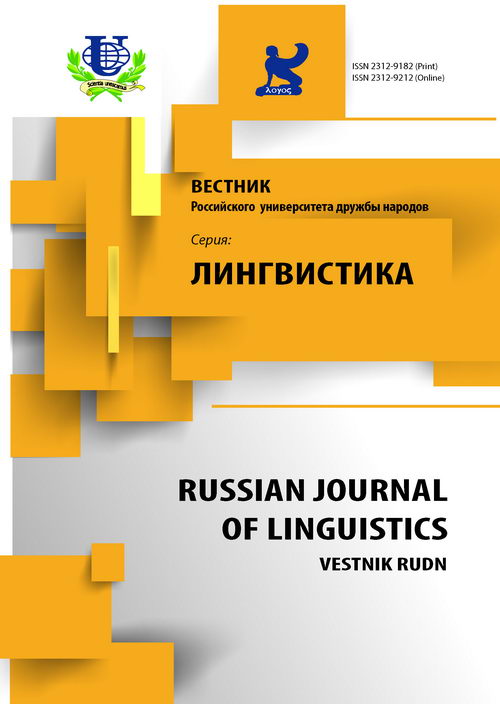No 3 (2009)
- Year: 2009
- Articles: 14
- URL: https://journals.rudn.ru/linguistics/issue/view/581
Articles
Language organization existance and functioning
Abstract
Nowadays science offers different methods of object study. With further science developing new study methods appear. This fact allows the scientists to seek for object additional characteristic features. The self-organization theory helps to study a language as a self-developing subject.
Russian Journal of Linguistics. 2009;(3):5-9
 5-9
5-9


Linguistic consideration of texts in internet
Abstract
The research deals with linguistic and cultural approaches in considering the texts in the Internet. Different types of texts are examined as well as a process and results of semantic and cultural relations among the texts in the Internet are analyzed.
Russian Journal of Linguistics. 2009;(3):10-17
 10-17
10-17


 18-23
18-23


Functioning of explicit wishes of goods in German and Russian art texts
Abstract
In the article the semantic analysis of functioning of explicit wishes of goods in German and Russian art texts is presented. Similarities and distinctions in thematic groups these wishes come to light. Also the quantitative analysis of the use of explicit wishes is made.
Russian Journal of Linguistics. 2009;(3):24-32
 24-32
24-32


 33-36
33-36


 37-44
37-44


Determination and description of «migratory groups of the words» in the system of the portuguese language
Abstract
The article determines the language units' transition from one lexico-grammatical class to another and vice-versa as a «units' migration» giving also a definition of the term «migratory process» in the system of the Portuguese language. These words are unified to «migratory groups», possessing morphological categories common for the lexico-grammatical classes between which they are located or «migrate», according to the article.
Russian Journal of Linguistics. 2009;(3):45-51
 45-51
45-51


The problem of the business negotiations language as genre of intercultural business communication
Abstract
Lingvocultural peculiarities of business negotiations in two variants of the English language (British and American) are analyzed in the article. The author researches discourse lexics, emotional colouring level, metaphor phrases, professional jargon and other linguistic and speech means in intercultural business discourse.
Russian Journal of Linguistics. 2009;(3):52-60
 52-60
52-60


About the linguacultural aspect of the advertisement influence on verbal consiousness of the modern youth audience (on the material of the sociolinguistics research)
Abstract
In this article on the experimental material there are analyzed the content and the character of modern Russian publicity texts influence on the speech culture of the youth audience; considered both negative and positive features of advertisement language in linguacultural aspect and from Russian language teaching point of view.
Russian Journal of Linguistics. 2009;(3):61-66
 61-66
61-66


The shaping of spanish spiritual literature of the 16th century: historical circumstances and social context
Abstract
This article deals with historical and social context of the 16th century Spanish Spirituality, the formation of its doctrinal settings and vocabulary, centering on the main peculiarity of this period: the non-existent delimitation of the spiritual and prophane, the oral and the written, and the popular and the refined culture.
Russian Journal of Linguistics. 2009;(3):67-73
 67-73
67-73


Genre-related temporary collocations in english discourse
Abstract
The paper discusses genre-related temporary collocations (TC). It also provides genre definition, analyzes different genre-related TC which are used in TV speeches, diplomatic texts, and English media texts. TC implementing in genre-related texts, preferential reinterpretation criteria which characterize terminology formation, their interpretation, and their translation from English into Russian is considered.
Russian Journal of Linguistics. 2009;(3):74-79
 74-79
74-79


The Indeclinable Nouns in Russian Language (Theoretical and historical problems)
Abstract
This article gives a brief discussion of the origin and categorisation rules of the indeclinable nouns in Russian. The grammatical features of the indeclinable nouns demonstrates itself not in morphology but in its collocations with the other parts of the sentences. The analysis of the indeclinable nouns helps to understand and differentiate the sentence elements of Language Isolate.
Russian Journal of Linguistics. 2009;(3):80-83
 80-83
80-83


The influence of migration on forming the Russian toponymic system of Eastern Transbaical
Abstract
The article reveals the main factors that had an effect on peopling the territory of Eastern Transbaical. Migrants' conduct towards the existing toponymic system is analysed. An attempt to single out the characteristic features and the main groups of XVII-XIX century Russian toponomy on the territory of Eastern Transbaical is made.
Russian Journal of Linguistics. 2009;(3):84-93
 84-93
84-93


ІІ Novikov Readings
Russian Journal of Linguistics. 2009;(3):94-96
 94-96
94-96
















